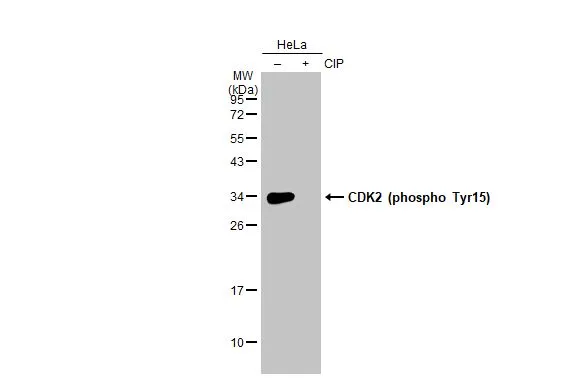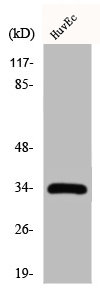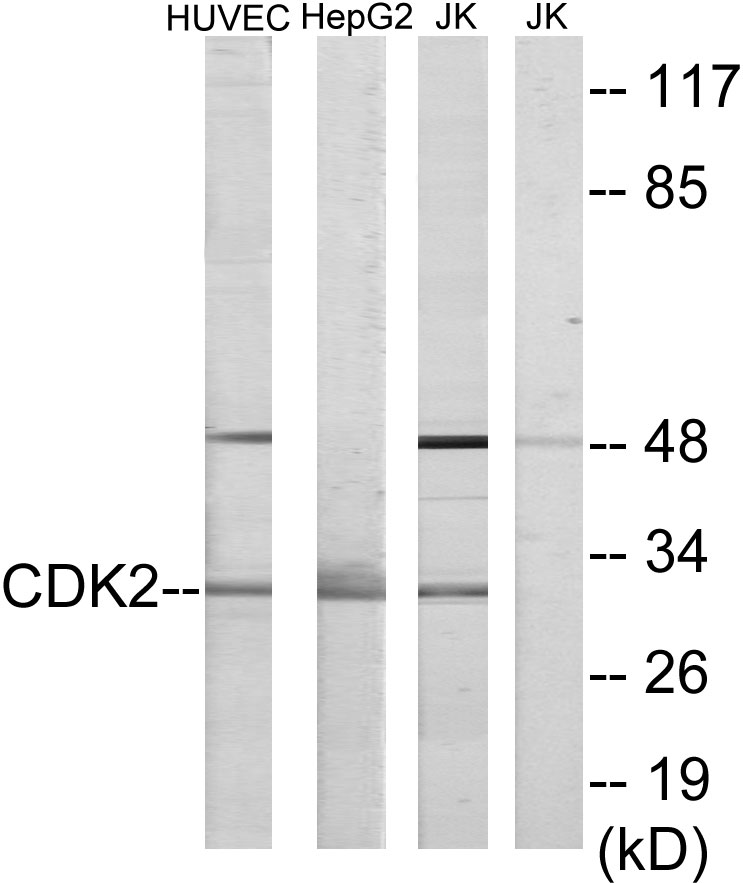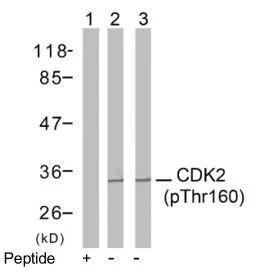
Untreated (–) and treated (+) HeLa whole cell extracts (30 μg) were separated by 12% SDS-PAGE, and the membrane was blotted with CDK2 (phospho Tyr15) antibody (GTX132802) diluted at 1:1000. The HRP-conjugated anti-rabbit IgG antibody (GTX213110-01) was used to detect the primary antibody.
CDK2 (phospho Tyr15) antibody
GTX132802
ApplicationsWestern Blot
Product group Antibodies
ReactivityHuman
TargetCDK2
Overview
- SupplierGeneTex
- Product NameCDK2 (phospho Tyr15) antibody
- Delivery Days Customer9
- Application Supplier NoteWB: 1:500-1:3000. *Optimal dilutions/concentrations should be determined by the researcher.Not tested in other applications.
- ApplicationsWestern Blot
- CertificationResearch Use Only
- ClonalityPolyclonal
- Concentration0.39 mg/ml
- ConjugateUnconjugated
- Gene ID1017
- Target nameCDK2
- Target descriptioncyclin dependent kinase 2
- Target synonymsCDKN2, p33(CDK2), cyclin-dependent kinase 2, cdc2-related protein kinase, cell division protein kinase 2, p33 protein kinase
- HostRabbit
- IsotypeIgG
- Protein IDP24941
- Protein NameCyclin-dependent kinase 2
- Scientific DescriptionThe protein encoded by this gene is a member of the Ser/Thr protein kinase family. This protein kinase is highly similar to the gene products of S. cerevisiae cdc28, and S. pombe cdc2. It is a catalytic subunit of the cyclin-dependent protein kinase complex, whose activity is restricted to the G1-S phase, and essential for cell cycle G1/S phase transition. This protein associates with and regulated by the regulatory subunits of the complex including cyclin A or E, CDK inhibitor p21Cip1 (CDKN1A) and p27Kip1 (CDKN1B). Its activity is also regulated by its protein phosphorylation. Two alternatively spliced variants and multiple transcription initiation sites of this gene have been reported. [provided by RefSeq]
- ReactivityHuman
- Storage Instruction-20°C or -80°C,2°C to 8°C
- UNSPSC41116161






![Untreated (–) and treated (+) NIH-3T3 whole cell extracts (30 μg) were separated by 12% SDS-PAGE, and the membrane was blotted with CDK2 (phospho Tyr15) antibody [HL1474] (GTX636948) diluted at 1:1000. The HRP-conjugated anti-rabbit IgG antibody (GTX213110-01) was used to detect the primary antibody.](https://www.genetex.com/upload/website/prouct_img/normal/GTX636948/GTX636948_T-44662_20230714_WB_M_treatment_CIP_23071822_229.webp)
![Untreated (–) and treated (+) NIH-3T3 whole cell extracts (30 μg) were separated by 12% SDS-PAGE, and the membrane was blotted with CDK2 (phospho Tyr15) antibody [HL3327] (GTX641092) diluted at 1:1000. The HRP-conjugated anti-rabbit IgG antibody (GTX213110-01) was used to detect the primary antibody.](https://www.genetex.com/upload/website/prouct_img/normal/GTX641092/GTX641092_T-45551_20241004_WB_M_treatment_CIP_24100900_858.webp)
